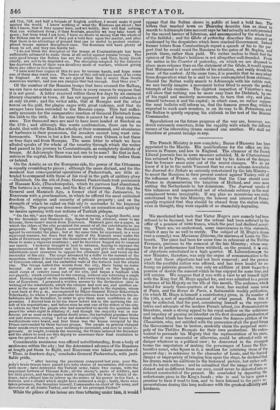We mentioned last week that Victor Hugo's new comedy had
been refused to be licensed, but that the refusal had been softened by the offer of a pension of 6000 francs, which the poet had declined accept- ing. There are, we understand, some inaccuracies in this statement, which it may be as well to rectify. The subject of M. Hugo's drama (not a comedy) was Marianne Delorme, the mistress of Louis the Thur. teenth. The piece had been for some time in rehearsal at the Thatre Francais, previous to the removal of the late Ministry; whose sanc- tion for its performance had been withheld, on the ground, it is said, of objections entertained in a high quarter. M. Labourdonnaye, the new Minister, therefore, was only the organ of communication to the poet that these objections had not been removed; and the pension which the youthful author was offered, and has been lauded for re- fusing on patriotic grounds, was only an addition of 2000 fraacs to a pension of double the amount which he has enjoyed for some time, and still retains. We suppose that it was with a view to set himself right with the King that M. Hugo applied for, and was admitted to a private audience of his Majesty on the 8th of this month. The audience, which lasted for nearly three-quarters of an hour, has excited some noise at Paris, and the Revue de Paris, a fashionable weekly publication, (to which M. Hugo is himself a contributor,) gives, in its number of the 15th, a sort of mystified account of what passed. From this it may be collected, that the poet, considering himself as the represen- tative and advocate of the modern French school, (or Romanticists) in literature, made a strong appeal to his royal auditor on the unfairness and impolicy of passing an interdict on the first dramatic production of that school which has been composed since the famous petition of the Classicists, who, not sati'sfied with the possession of all the good things the Government has to bestow, modestly claim the perpetual mono- poly of the ThRtre Francais for their own production. He endea- voured to persuade his Majesty that the representation of his piece, whether it was successful or otherwise, could be attended with no danger whatever in a political view ; he disavowed in the strongest terms the imputation of making the personages of Louis the Thir- teenth's court, who figure in it, a medium for satirizing those of the present day; in reference to the character of Louis, and the fancied danger or impropriety of bringing him upon the stage, he declared that his drama made no additions to the historical picture, but rather soft- ened its harsh outlines ; and he submitted that the image of times so distant and so different from our own, could never be distorted into an indirect counterfeit of the present. He concluded by depositing unfortunate piece in the King's hands ; who is said to have given a promise to have it read to him, and to have listened to the poet's re- presentations during this long audience with the greatest affability and
kindness. the


















 Previous page
Previous page